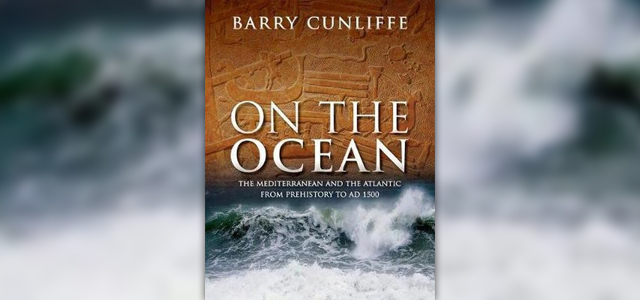Review: On the Ocean – The Mediterranean and the Atlantic from Prehistory to AD 1500
Author: Barry Cunliffe
Barry Cunliffe is an archaeologist familiar with both the broad sweep and the intricate detail, and his books are rewarding sites for the archaeologically and historically inclined reader to dig. His most recent books have a distinctive style, in between coffee table book and popular history, with carefully selected illustrations and maps, and non-specialist readability. Usually he considers what happened between the oceans (as the title of one of his books on Eurasia has it), but here he concentrates on what Europeans did on the oceans.
In more reflective passages he conveys the tension for land-dwellers on a planet dominated by oceans. As he says, land is a place – a home, safe – but the sea is space – a region to explore, with opportunities. To set sail required bravery and skill. Cunliffe’s book records the developments in technology that kept pace with human beings’ curiosity and determination, from paddles to sails, and from hollowed out logs to intricately constructed plank-sided vessels.
The sailors also needed special awareness – mental maps aided by stars at night, and landmarks and memorised distances during the day. This to offset the forbidding nature of especially the Atlantic, the ‘Sea of Perpetual Gloom’ (hardly a glowing travel recommendation). The Greeks thought the exceptional Phoenicians, who had ventured into the Atlantic probably by 600 BC, were mad. For Julius Caesar, the Atlantic shore was as far as the Roman Empire needed to go, though ever practical, he noted for potential future naval battles the superior characteristics of the Atlantic people’s boats. Arabs likewise feared the sea, and one Arab leader rode his horse into the Atlantic, not as a Canute-like show of hubris, but to indicate that the Arab armies had reached their limit.
In the Bible the ocean is generally out of bounds. Quite literally, to the biblical writers, ‘here be monsters’. No wonder, as the Jews had no decent sea ports, and with little familiarity with seafaring, they turned their backs on the sea. For others facing the Atlantic, it inspired the imagining of distant lands, exotic peoples, myths and gods. The ocean was a liminal space between heaven and earth, and the dead were often farewelled in boats, pushed out toward the afterlife which surely lay beyond the watery horizon. Yet for the Portuguese, the Danes or the Irish the Atlantic beckoned. It was dangerous, yes, but held potential.
Why did people take to the waters? For some, it was the sheer adventure and the potential for fame. Wanderlust, says Cunliffe, is a persistent human characteristic. The challenge could also reap material reward. There was the simple issue of sustenance – fishing was an early lure, pulling fisherman further and further out. It is likely that fisherman after cod discovered North America long before Columbus.
Then there was trade. Cunliffe maps out in detail the pottery finds that confirm the large trading networks of Neolithic peoples. Wine, spices, leather, silk and gold flowed into Britain, in exchange for wool and tin. Forays down the coast of Africa produced ivory and slaves. Later, of course, the Indies and their spices enticed the Spanish and Portuguese to head west. Contrary to popular belief, they had long understood the world was round, and from quite sophisticated calculations reckoned China was an easy sail across the Atlantic. And if you couldn’t trade, you could always steal, as the Vikings proved.
Patterns of trade and migration led to cross-cultural pollination. Along with the ills of Spanish conquest of the Americas came the desire to evangelise. Irish monks had a contrary idea. The search for isolation led them to make challenging sea journeys to uninhabited islands. They were called peregrini, from which we get our word peregrination (or wandering). It is beyond the scope of Cunliffe’s book, but crossing the ocean to North America or Australia became for religious dissenters the only way to ensure their religious liberty. Like coconuts, Christianity was carried by the ocean waves to the corners of the earth.
Nick Mattiske














1 thought on “Christianity’s wave of enthusasim”
What a great review! Thanks Nick, you’ve given me a taste of the content and the intent of the author, made some analytical comment without smothering us in your own views and therefore enticed me to check it out. I aspire to writing reviews like this.